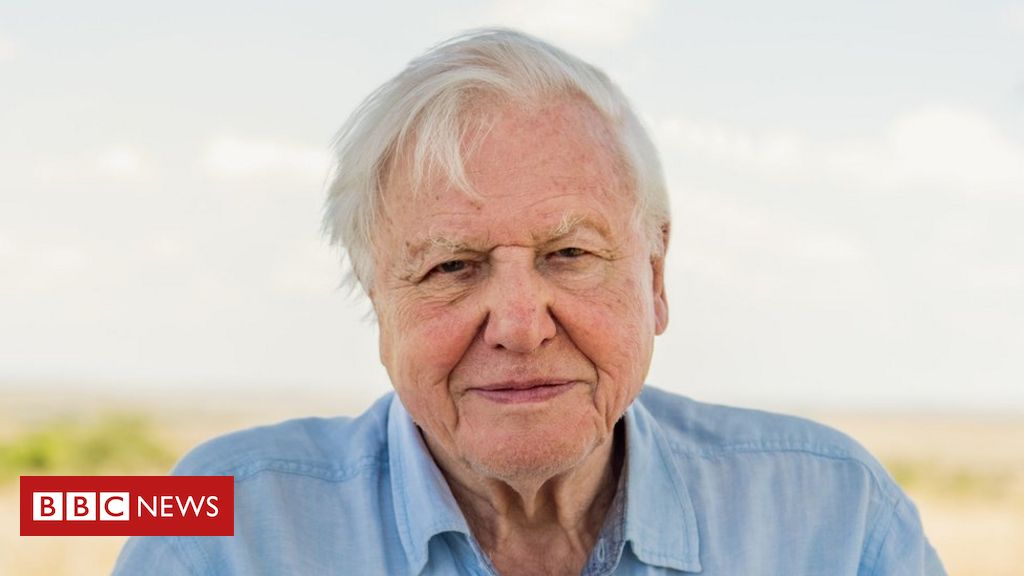Sir David Attenborough has called on world leaders to do more to protect nature.
He made his plea as 65 heads of state and government, including the UK’s, signed a global pledge to reverse losses in the natural world by 2030.
Addressing the virtual United Nations event, he said world leaders had a chance to make a difference.
A recent BBC documentary, presented by Sir David, issued a stark warning about the extinction crisis and its effects.
“If ever we needed a strong signal from world leaders, for people like you, that we are going to solve this, then this is now,” he told the delegates.
Last year, a UN report found that around one million species are now threatened with extinction.
Hunting, habitat destruction and other human activities are pushing a rich array of animals to the edge of oblivion. Human encroachment on the habitats of wild animals also increases the risk of outbreaks of new disease.
- What’s in Boris Johnson’s climate in tray?
- Where are England’s 10 national parks?
During the virtual event, the UK Prime Minister Boris Johnson announced a commitment to protect an extra 400,000 hectares of countryside to support the recovery of nature.
He promised that the government will increase the amount of protected land in the UK from 26% at present to 30% by the end of the decade.
Mr Johnson said countries must turn “words into action” and “agree ambitious goals and binding targets”.
“We cannot afford dither and delay because biodiversity loss is happening today and it is happening at a frightening rate,” he said.
“Left unchecked, the consequences will be catastrophic for us all.
“Extinction is forever – so our action must be immediate.”
Wildlife groups welcomed the announcement but said the UK is one of the world’s most nature-depleted countries, with a quarter of native mammals threatened with extinction, including wild cats and red squirrels.
World leaders have often come together to strike deals over climate change, but a top level commitment on nature is much rarer.
Environmentalists are delighted – they say nature is in freefall and urgently needs protection as roads, railways, housing and farmland cover the Earth.
But they say Boris Johnson must lead by example. They point out that around half of existing Sites of Special Scientific Interest in the UK are in poor condition, many through a lack of funding.
What’s more, measures to protect wildlife in the Environment Bill are becalmed in the Commons for want of parliamentary time.
Campaigners say if the UK is really taking nature seriously it must avoid trade deals that damage wildlife.
It must also clamp down on imports of food that have caused environmental destruction overseas – such as beef farming in the Amazon.
Craig Bennett, chief executive of The Wildlife Trusts, said “a much greater level of urgent action” was needed to put nature into recovery, including rescuing wildlife sites currently in decline.
The government figure of 26% includes national parks and areas of outstanding natural beauty (AONBs), which are more about how our landscape looks as opposed to the state of nature within them, he said.
He told BBC News: “The reality is, at best what’s being managed for nature at the moment is only 10%. Even according to the government’s own advisers on nature, they say half of that is in a poor condition, so it’s nearer 5%. We’ve got a mountain to climb if we’re really going to put nature into recovery in this country and reach the Prime Minister’s target by 2030.”
He added that the UK needs to do a much better job of managing the sites that already exist as well as connecting spaces for nature that are not currently protected under the planning system or environmental laws.
The Prime Minister has signed up to the Leaders’ Pledge for Nature, the initiative launched virtually on Monday, which includes commitments to prioritise a green recovery following the coronavirus pandemic, deliver ambitious biodiversity targets and increase financing for nature.
National parks, AONBs and other protected areas make up 26% of land in England.
The environment is a devolved matter, but the government has said it will work with Scotland, Wales and Northern Ireland, as well as landowners, to increase the amount of protected land across the UK.
Martin Harper, the RSPB’s director of global conservation, said the 30% commitment could be a “huge step towards addressing the crisis our wildlife is facing”.
“However, targets on paper won’t be enough,” he said. “Those set a decade ago failed because they weren’t backed up by action.”
Mr Harper said the pledge must be put into domestic law “as part of a suite of goals to restore the abundance and diversity of our wildlife, in every country in the UK”.
The event will be followed on Wednesday by a UN summit on biodiversity, which is regarded as a key opportunity for leaders to raise their ambition on tackling the loss of nature.
A series of meetings are planned in the run up to next year’s UN Convention on Biological Diversity, which will agree a 10-year strategy to halt global biodiversity loss.
The event in Kunming, China, was due to take place in October 2020, but it will be delayed due to the coronavirus pandemic.
Earlier this month, the UN reported back on the progress made on biodiversity goals agreed in 2010 with a 2020 deadline. It said not one of the 20 global targets had been met in full.
Follow Helen on Twitter.
Source: Read Full Article

